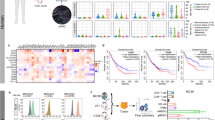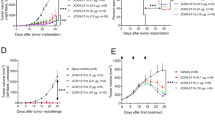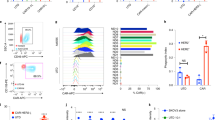Abstract
Suicide gene therapy has been studied intensively for the treatment of cancer. A limited antitumoral effect was obtained by intratumoral injection of adenovirus harboring Escherichia coli cytosine deaminase gene (AdCD) in tumor-bearing mice followed by continuous administration of 5-fluorocytosine (5FC). To address the drawbacks of the limited potential for the induction of antitumoral immunity by CD suicide gene therapy, we hypothesized that antigen-presenting cells (APCs) might contribute to the efficient induction of an antitumoral immune response in tumor-bearing mice undergoing suicide gene therapy. We preinjected the mice with murine stem cell factor (SCF)-encoding adenovirus (AdSCF) and murine granulocyte-macrophage colony-stimulating factor (GM-CSF)-encoding adenovirus (AdGM-CSF); after 7 days, the mice were inoculated with CT26 colon adenocarcinoma. AdCD was injected intratumorally into tumor-bearing mice followed by 5FC administration. The results showed that AdSCF/AdGM-CSF treatment could increase the number, surface molecule expression, and function of APCs efficiently. A more significant growth inhibition of established tumors and a prolongation of the survival period were observed in tumor-bearing mice after AdSCF/AdGM-CSF pretreatment in combination with AdCD/5FC therapy when compared with mice treated with AdSCF or AdGM-CSF in combination with AdCD/5FC, or AdCD/5FC alone (P < .01). Cytotoxic T-lymphocyte activity was induced efficiently after the combined therapy, and mRNA of tumor necrosis factor-α, interleukin-4, interferon-γ, and interleukin-2 was present in the tumor mass after combined therapy, suggesting that a more potent antitumoral response was induced by enhanced APCs. Our results demonstrated that AdSCF/AdGM-CSF pretreatment could activate APCs, and that these APCs could present the tumor antigens released from AdCD/5FC-killed tumor cells and activate the antitumoral response of the host, thus increasing the therapeutic efficiency of suicide gene therapy.
This is a preview of subscription content, access via your institution
Access options
Subscribe to this journal
Receive 12 print issues and online access
$259.00 per year
only $21.58 per issue
Buy this article
- Purchase on Springer Link
- Instant access to full article PDF
Prices may be subject to local taxes which are calculated during checkout
Similar content being viewed by others
Author information
Authors and Affiliations
Corresponding author
Rights and permissions
About this article
Cite this article
Cao, X., Huang, X., Ju, D. et al. Enhanced antitumoral effect of adenovirus-mediated cytosine deaminase gene therapy by induction of antigen-presenting cells through stem cell factor/granulocyte-macrophage colony-stimulating factor gene transfer. Cancer Gene Ther 7, 177–186 (2000). https://doi.org/10.1038/sj.cgt.7700114
Received:
Accepted:
Published:
Issue Date:
DOI: https://doi.org/10.1038/sj.cgt.7700114
Keywords
This article is cited by
-
Chemovirotherapy for head and neck squamous cell carcinoma with EGFR-targeted and CD/UPRT-armed oncolytic measles virus
Cancer Gene Therapy (2012)
-
Systemic genetic transfer of p21WAF−1 and GM-CSF utilizing of a novel oligopeptide-based EGF receptor targeting polyplex
Cancer Gene Therapy (2003)
-
Enhanced antitumor effect of EGF R–targeted p21WAF-1 and GM-CSF gene transfer in the established murine hepatoma by peritumoral injection
Cancer Gene Therapy (2002)



